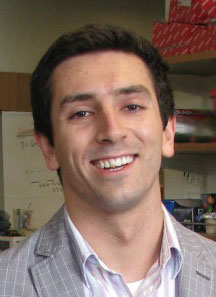Omer Bayraktar to lead new research group in the Cellular Genetics Programme

The Wellcome Sanger Institute is pleased to announce that Omer Bayraktar will be joining its Cellular Genetics Faculty in August 2018 to create a map of the individual cells and networks in the cortex of the human brain. Omer’s work will help to lay the foundations needed to understand how this complex region of the brain develops and functions.
With the knowledge of how the cortex works, researchers will then be able to explore which cells and signalling pathways are functioning differently in conditions such as schizophrenia. They will also be able to discover which cells have been affected in children and adults with neurodevelopmental disorders.
“The cerebral cortex lies at the heart of how we think and behave. It plays a major role in many neurodevelopmental conditions and disorders such as autism and schizophrenia. Yet we don’t fully understand how it develops and how it works , and so we can’t identify what happens when things go awry. My team will be mapping the genetic landscapes, interactions and actions of the billions of cells that make up this amazing structure to provide this much needed biological map.”
Omer Bayraktar is currently a Postdoctoral Fellow in David Rowitch’s research group at the University of California San Francisco and the University of Cambridge
To identify and classify the estimated 16 billion neurons (signalling cells) and 60 billion glial (non-neuronal cells) at work in the human cortex would take many lifetimes. So, one of the key priorities for Omer’s team will be to develop large-scale, high-throughput, automated techniques and pipelines to sequence, map and image the individual cells.
These large-scale spatial transcriptomic pipelines will create and deploy automated techniques for histology and imaging, using single molecule fluorescent in situ hybridisation (smFISH) to identify different molecular cell types. These techniques will benefit the Sanger Institute’s contribution to the Human Cell Atlas project and enable a number of Sanger research teams to study cell signalling, interactions and pathways at work in many disabling conditions throughout the body.
In Omer’s previous role, he developed a high-throughput pipeline to map single-cell gene expression and neural subtypes in situ. This process helped him to investigate the makeup and role of star-shaped support cells (astroglial cells) in the mouse cerebral cortex and discover that the astroglial cells display a wide diversity of gene expression and action.
“I am fascinated by the cellular complexity of our brains. Until now, attempting to map the position, function and gene activity of every cell in the cerebral cortex would have been unthinkable. But, with the advent of high-throughput single-cell technologies, combined with the expertise of the Sanger Institute in delivering science at scale, we can now start to piece together the jigsaw puzzle of our brains, cell by cell.”
Omer Bayraktar whose research team will be exploring the cellular makeup of the brain at the Wellcome Sanger Institute
Sarah Teichmann, Head of Cellular Genetics Programme at the Sanger Institute is thrilled that Omer will be joining the Faculty. Over the next few years, the Programme is seeking to concentrate its research efforts on exploring the emerging field of single-cell genomics to unlock understanding of complex interactions within the body.
“I am delighted that Omer will be leading a new research team in the Sanger’s Cellular Genetics Programme. His ideas, approaches and insights will help us to build exquisitely accurate 3-D maps of human organs and identify the role of each cell within the greater whole. His expertise will help to drive forward the work of the Human Cell Atlas project and help us to delve into the complex interactions taking place between the cells we identify.”
Sarah Teichmann Head of the Cellular Genetics Programme at the Wellcome Sanger Institute and Co-Chair of the Human Cell Atlas Organising Committee
Postdoctoral, imaging specialist and PhD student positions will be available in Omer’s team. Please visit the Bayraktar group web page and the Sanger jobs site for more information.
More information
Selected websites
The Wellcome Sanger Institute
The Wellcome Sanger Institute is one of the world’s leading genome centres. Through its ability to conduct research at scale, it is able to engage in bold and long-term exploratory projects that are designed to influence and empower medical science globally. Institute research findings, generated through its own research programmes and through its leading role in international consortia, are being used to develop new diagnostics and treatments for human disease. To celebrate its 25th year in 2018, the Institute is sequencing 25 new genomes of species in the UK. Find out more at www.sanger.ac.uk or follow @sangerinstitute


